Business School Enrollment Trends: Undergraduate, Generalist Master’s, Specialized Master’s, and Doctoral Programs
As noted in my November 2017 article, at different stages of an individual’s career there are differences in learning needs. Early in one’s career, an employee typically needs a broad foundation but also may need deep specialized knowledge, particularly in areas like accounting, finance, and data analytics. At other stages, individuals need a higher level of broad knowledge, skills, and abilities in order to manage teams and organizations. These features may be found in generalist programs such as a Master’s in Business Administration (MBA). With rapid changes in technology and business, individuals are also likely to need to re-skill themselves periodically. As a result, they may need additional specialized education. Let’s take a look at the enrollment landscape among these different types of programs at AACSB Business Education Alliance schools.
Current Business School Enrollment Landscape
For the 2016–17 Business School Questionnaire, 653 accredited schools reported data on undergraduate and graduate enrollment with aggregate enrollments of about 1.9 million students. Globally, about 72 percent of these enrollments were undergraduate, 15 percent were generalist masters, 11 percent were specialized master’s, and about 1.5 percent were at the doctoral level. Generalist master’s programs primarily consists of MBA programs including executive MBA programs and joint MBA programs. They also include some other master’s programs, such as a Master’s in Management or a Master’s in International Business Studies—if they are generalist in nature.
Specialized master’s programs are those that take a deeper dive in disciplines such as accounting, finance, information systems, management science, and marketing. Often when pundits talk about business school trends they focus solely on the MBA. Figure 1 below demonstrates the diversity of business school degree programs and is a good reminder of the significance and importance globally of other types of business degrees, such as core undergraduate business programs, which comprise the majority of business school enrollments. Specialty master’s programs have also become more significant given the complexity of individual business disciplines in today’s world.
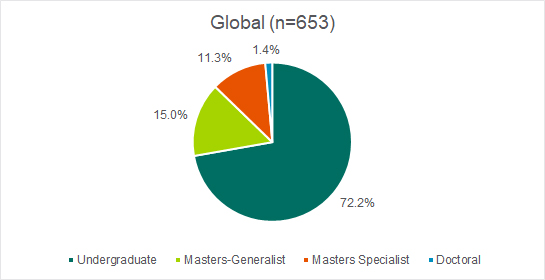
Figure 1. Enrollment percentages in undergraduate, master’s, and doctoral degree programs globally, 2016–17 BSQ
There are distinctive differences across the three regions served by AACSB—the Americas; Europe, the Middle East, and Africa (EMEA); and Asia Pacific (AP). In the Americas, over 80 percent of enrollments are undergraduate, while in EMEA they are just over 50 percent. EMEA and AP have a balance of generalist and specialist master’s programs, while in the Americas these programs account for a smaller proportion. This finding is not surprising because (1) specialty master’s programs have been present in EMEA for a much longer period of time than in the Americas, and (2) there is high demand for specialty master’s programs in the AP region.
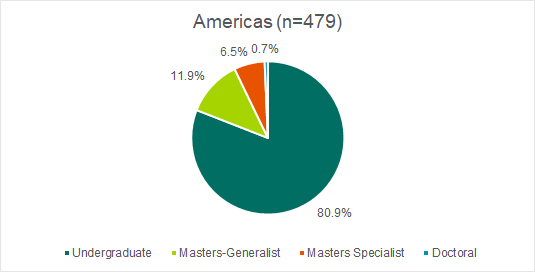
Figure 2. Enrollment percentages in undergraduate, master’s, and doctoral degree programs for Americas, 2016–17 BSQ
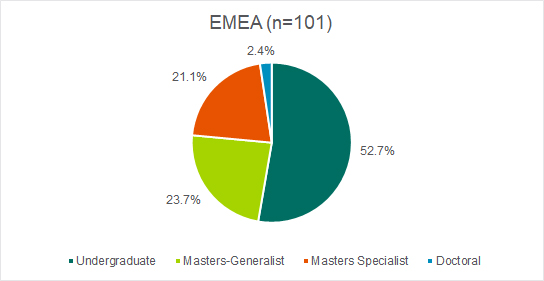
Figure 3. Enrollment percentages in undergraduate, master’s, and doctoral degree programs for Europe, Middle East, and Africa, 2016–17 BSQ
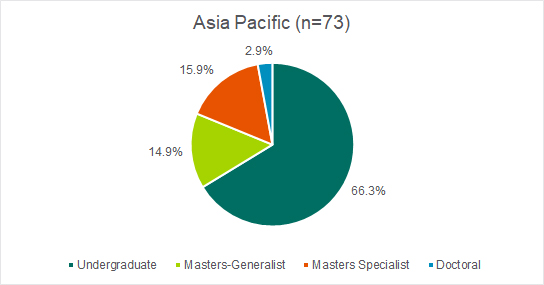
Figure 4. Enrollment percentages in undergraduate, master’s, and doctoral degree programs for Asia Pacific, 2016–17 BSQ
Recent Business Degree Enrollment Trends
Let’s take a look at trends over time. Given the growth in the number of schools that are part of the AACSB Business Education Alliance, we used a controlled set of schools that reported enrollment data for the periods 2011–12 and 2016–17 in order to quantify and compare enrollment growth between degree programs. Total business degree program enrollment over this five-year period increased by almost 11 percent globally. The “rising star” was in specialized master’s programs, which registered more than a 30 percent increase. Generalist master’s degree enrollments were up a modest 3 percent globally. Undergraduate enrollments were up a solid 10 percent, and doctoral enrollments increased by almost 6 percent.
The five-year trend in specialized master’s programs is consistent with growth in other specialized educational qualifications, such as the Chartered Financial Analyst® (CFA) program, which saw similar growth over the same period. The growth in specialized master’s programs is robust across regions. It was up over 20 percent in both EMEA and AP and up 45 percent in the Americas. Generalist master’s programs were quite different across regions, with small declines in the Americas and AP and substantial increases in EMEA. Undergraduate enrollments were up in the Americas and AP, but down in EMEA. Doctoral enrollments were up in all three regions.
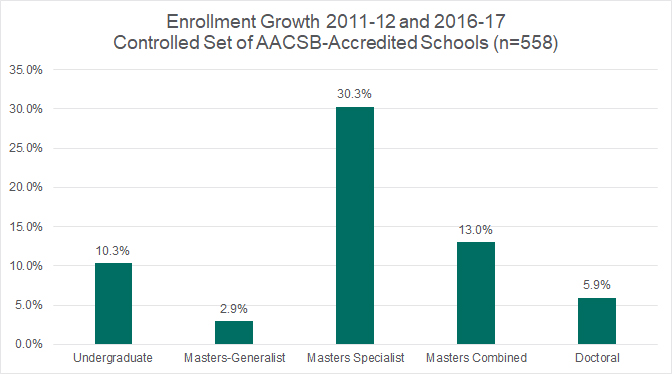
Figure 5. Five-year trend of enrollment growth by degree type, 2011–12 through 2016–17 BSQs
Specialty Master’s Enrollments
For schools that provided detail by discipline, we show below enrollment for the top 10 specialized master’s programs. Accounting tops the list by a wide margin. Finance and information systems are in the No. 2 and 3 slots, also by a wide margin to the other disciplines. To place these numbers in perspective, there were about 210,000 enrollments in specialized master’s programs in the 2016–17 sample.
Table 1. Specialized master’s program disciplines, BSQ 2016–17
| Accountancy (or Accounting) | 21,378 |
| Finance | 7,494 |
| Information Systems/Technology | 5,914 |
| Management (Specialist) | 2,287 |
| Management Science | 2,645 |
| MS in Business Administration | 2,196 |
| International Business | 2,140 |
| Taxation | 1,327 |
| Marketing | 1,101 |
| Health Administration | 734 |
As noted previously, the complexity and dynamic nature of the business world today and the periodic need for re-skilling means the overall need for specialized programs such as these are likely to continue. The specialty disciplines and their ranking, however, are likely to change, including the introduction of new disciplines.
Parting Thoughts
As can be seen from the profile of AACSB Business Education Alliance educational institutions, business schools offer a diverse set of degree programs (as well as many certificate, continuing education, and executive education programs) to meet the lifelong learning needs of individuals. This variety of programs is necessary because no single program is right for all individuals or for any single individual over the course of their career. As a whole, the business school ecosystem, including the business community, must work in concert to provide individuals with the right knowledge, skills, and abilities at the beginning of their career and throughout their work life.





